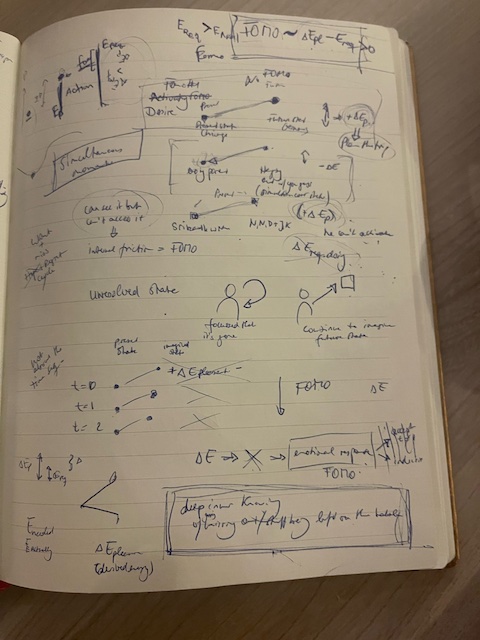The Mathematics of FOMO
Have you ever felt a twinge of anxiety when scrolling through social media, seeing all the fun events and experiences your friends are having without you? That’s FOMO, or Fear of Missing Out. But what exactly is FOMO, and why do we feel it?
A couple months ago, I was traveling through Germany with my favorite people. One night, my brother-in-law was feeling FOMO for having to work in his hotel room while the rest of us went out, leading one of my closest friends to confess that she had never felt FOMO before and didn’t understand the feeling. Why would you fear missing something?
The rest of us were flabbergasted and eyed her with deep suspicion before throwing example after example at her of when we had felt FOMO. Luckily, she was a theoretical physicist, so she diligently catalogued our examples and created a new model…
Here’s what we know:
- FOMO requires 2 simultaneous timelines: your current one and an alternative one you could be enjoying.1
- You feel more FOMO if there is a larger gap between the fun you’re having now and the fun you could have been having. Intuitively, you won’t feel FOMO if what you’re doing now is just as fun as the alternative.
- You will feel less FOMO if the alternative option was impossible to do or required too much activation energy.
Putting these together2, we concluded that

where Ptheoretical is how much pleasure or fun you expect from the alternative activity, Pactual is how much fun you’re having now, Erequired is how much energy you would need to do the alternative activity, and Eavailable is how much energy you have available now.
In other words, FOMO is proportional to the difference in pleasure divided by the difference in energy required.
Difference in Pleasure
If you’re missing the best party in the world (however you define that) because you have to do chores, Ptheoretical is way larger than Pactual and there’s going to be a lot of FOMO. On the other hand, if while doing chores, you find a winning lottery ticket under your couch, your FOMO for the party might evaporate.
FOMO increases as the delta between theoretical and actual pleasure increases. If it’s ever negative, there’s no FOMO because that means you’re already on the more optimal path.
Difference in Energy
Similarly, you’re going to feel more FOMO if you missed out because you forgot to reply to a friend’s text. The activation energy needed to achieve the missed opportunity was so low. However, if you needed to collect the root of a Quiver Tree, soil from Mordor, and a witch’s toenail first, you’re going feel a lot less FOMO because it was highly unlikely you could have made it anyway. You’re not “missing out” because it was never yours to begin with.
FOMO increases as the delta between required and available energy decreases. If it’s ever negative, there’s no FOMO because that means you would have already chosen the more optimal path.
Note that “energy” is an all-encompassing term for you and your environment’s kinetic and potential energies, not just your internal energy levels. It doesn’t matter how much cocaine you do, if you need soil from Mordor, Erequired will always be astronomically greater than Eavailable. More realistically, finances are a common external blocker. If you don’t have enough money to do something, the activation energy required would include the energy and time needed to first make enough money to overcome that blocker. If you only needed $10 more, that’s going to create more FOMO than if you needed to make $1 million first. This is why you don’t feel FOMO for missing your favorite celebrity’s party even when you’re in the same town.
Division by Zero?
You may have noticed by now that this model breaks if Erequired is equal to Eavailable. That’s because FOMO only applies if Erequired > Eavailable and Ptheoretical > Pactual. In all other scenarios, you would have chosen the more pleasurable decision already so there can’t be any FOMO by definition. Or visually,
Now What?
Next time somebody asks if you’re feeling FOMO, you can calculate it! Interestingly, ever since I’ve started thinking of FOMO in these terms, the feeling has entirely disappeared. Now I can directly identify how there was too much energy differential or not enough pleasure differential and preemptively halt the anxiety-inducing mental process.
I’m fascinated by this idea of describing a mental process with an equation. What other emotions can we define with mathematics? If this is interesting to you, subscribe to my friend’s newsletter where she writes about more insights like these!

